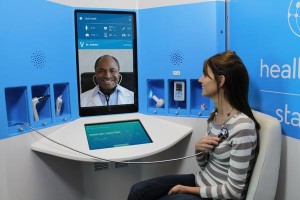Pathologists may want to explore the opportunity to be tele-consultants and be paid for helping consumers understand their lab test results and other clinical findings
First it was rapid medical clinics in retail pharmacies. Next came health kiosks with information for consumers in pharmacies. Now a national pharmacy chain is upping the ante by installing enclosed health kiosks in their stores that deliver telemedicine services, thus allowing customers to speak with physicians and other medical providers in private from within the pharmacy.
For pathologists and clinical laboratory managers watching as national pharmacy chains introduce ever more medical services in their retail stories, the telemedicine kiosks is one more piece of evidence that, at some future point, pharmacies will want to provide medical laboratory testing services. In fact, lab testing is the basis for an existing agreement between Walgreens and Theranos, a lab testing company with ambitious plans to be disruptive.
It is Rite Aid Corporation (NYSE:RAD), that plans to take the health kiosk idea to a new level. Its telehealth concept allows pharmacy shoppers to consult directly with physicians via a kiosk. HealthSpot, a Columbus, Ohio-based telemedicine provider, recently launched a pilot involving the telehealth kiosks at Rite Aid stores in Ohio. It is also developing a network of board-certified physician consultants to expand this service nationwide.

Currently being piloted in Ohio Rite Aid pharmacies, HealthSpot kiosks are bringing doctors to patients via a telemedicine portal. This service offers a 15-minute video-conferencing visit with a board-certified physician for $59 to $79. Most major insurance plans are also accepted. (Photo copyright HealthSpot)
HealthSpot is a pioneer in connected healthcare concepts. Its HealthSpot station is a comprehensive healthcare delivery platform that combines cloud-based software with digital medical devices and mobile applications. The HealthSpot platform is designed to deliver affordable medical care through convenient locations, such as pharmacies, hospitals, clinics, employer and community sites, universities, and at home.
This is HealthSpot’s first partnership with a major retailer. The 40-square-foot, fully enclosed HealthSpot Station employ’s cloud-based telemedicine software. Patients interact with doctors and other healthcare professionals through high-definition video conferencing with digital medical devices. Similar to an office visit, consumer visits with kiosk physicians average 15 minutes, noted a report published by MedCity News.
Rite Aid’s pilot project in Ohio has engaged Cleveland Clinic staff clinicians, along with physicians at other major Ohio health institutions. These providers respond to consumer questions on a range of common and minor health issues. This healthcare service, which accepts most major insurance plans, makes seeing the doctor convenient.
In a HealthSpot press release that announced the launch of the Rite Aid pilot, HealthSpot Founder and CEO Steve Cashman observed, “With telehealth expected to play a leading role in the delivery of healthcare in the future, we believe our HealthSpot stations offer a unique solution, delivering healthcare services more conveniently and cost effectively than ever before. By working with Rite Aid, as well as providers and payers, we are reimagining the way healthcare is delivered in a retail setting.”
For its part, Rite Aid sees the telehealth kiosks as a logical next step. “Adding HealthSpot stations serves as a natural extension of our existing suite of health and wellness services and offers people an alternative solution to accessing quality healthcare in a familiar, professional, and convenient setting,” said Rite Aid’s Executive Vice President of Pharmacy Robert I. Thompson.
Headquartered in Camp Hill, Pennsylvania, Rite Aid operates nearly 4,600 stores in 31 states and the District of Columbia. In recent years, it acquired Houston-based RediClinic, one of the nation’s major operators of retail clinics.
Dark Daily is watching the development of in-store health stations. It was in 2013 when we introduced medical laboratory managers and pathologists to the development of the SoloHealth kiosk (See Dark Daily, “Health Kiosk Offers Consumers Self-Serve Health Screenings, Preventative Health Help, and Information on Health Plans and Obamacare,” December 23, 2013). These stations allow consumers to check their vision, blood pressure, and body-mass index. Consumers can also assess their health risks and learn about actionable recommendations based on their individual health risks.
SoloHealth provides access to a database of local healthcare providers at various retail locations, but does not connect consumers directly to physicians. It has kiosks in 3,500 retail stores, including Walmart (NYSE:WMT), Safeway (NYSE:SWY), Sam’s Club, Schnucks Markets (NYSE:WMK), Vons, Tom Thumb, and Randalls.
Now that at least one pharmacy chain is piloting healthcare kiosks that allow consumers to privately interact with physicians and other providers in telehealth settings, the question may soon be whether pathologists would like to be included on the provider panels that these consumers can access from within the healthcare kiosk. Assuming that fees are paid to physicians who provide the telehealth services, there may be revenue opportunities for pathologists interested in providing such consultative services.
—Patricia Kirk
Related Information:
Rite Aid and HealthSpot Announce Plans to Pilot HealthSpot Stations
Rite Aid to Pilot HealthSpot Telehealth Kiosks in Ohio
Consumer Wellness Trend Portends Change in Existing Lab Testing Business Model


